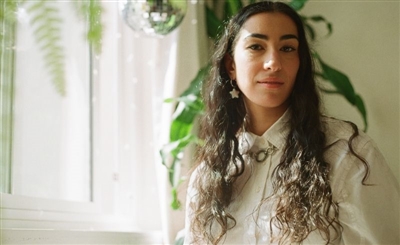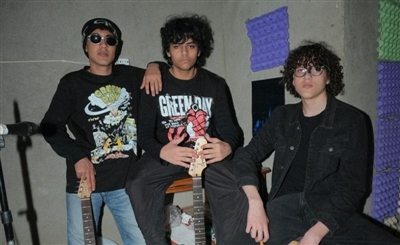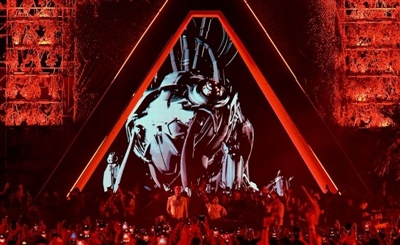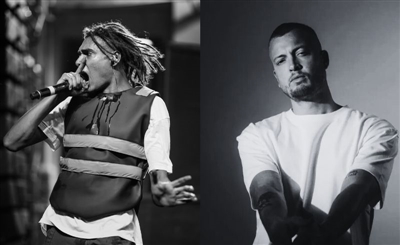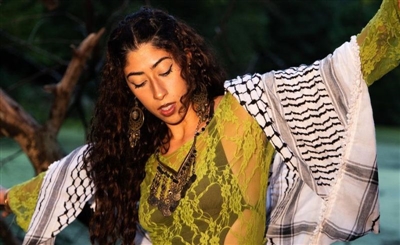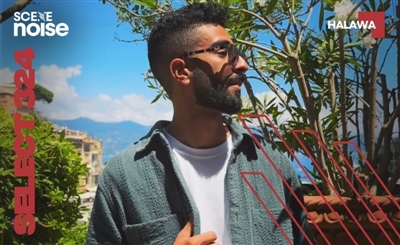Israeli Artist Mary Ocher on the Socio-Economic Influences Found in Art
After stumbling on Ocher's work last month, we were so intrigued that we had to reach out for an interview. A lot of things she says will change the way you think.
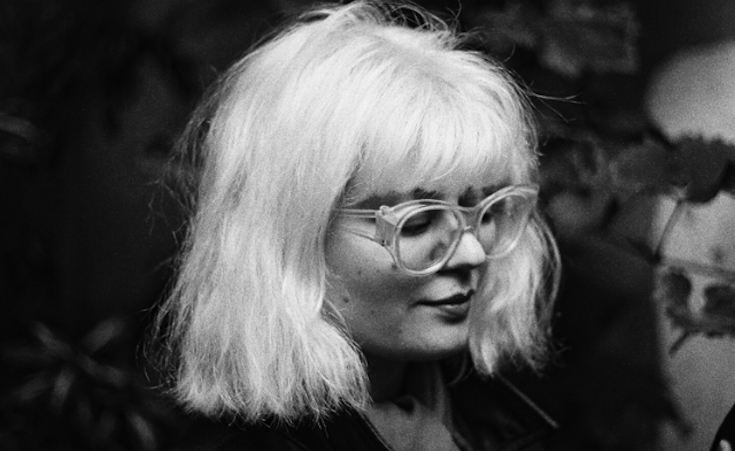
Mary Ocher is a Russian-Israeli multimedia artist that writes and sings her own songs. She writes poetry, and is a multi-disciplinary visual artist in that her work includes painting, photography, and film. She was born in 1986 in Moscow to an unemployed engineer mother and a father working as a puppeteer and voice actor at Moscow's Obrasov Theatre the country's national puppet theatre, and perhaps the biggest in the world. Both of her parents are of Jewish descent, and ten years after her father lost his job at the theatre, as the Soviet regime started sinking, where citizens of the country were for the first time allowed to leave permanently, they all moved to Israel.
In the past 11 years, Ocher published four solo albums, with the fifth The West Against The People set for release on the 10th of March. She also directed several music videos, one of which is The Endlessness (A Song for Young Xenophobes), a project that contains footage of Egypt's Western Desert. Another video that really caught our attention was shot in Israel for a song called Arms showing images of armed civilians, army personnel, and even a store selling toy guns for kids in Tel Aviv, portraying the country's potent gun culture.
Not all of her songs are political, or necessarily aim to deliver a message. Some of them are entirely abstract, fringing on several genres, including post-punk, garage, and folk rock. It's avant-garde music, hardly comparable to contemporary releases being put out today. It's entirely new yet sounds very familiar, her singing voice is unconventional, so is the way she dresses, and her on-stage showmanship is unlike anything we have come across before.
We reached out for an interview, and she cordially complied...
So Mary, tell us a bit about your childhood.
By the mid-80s my dad was laid off from the puppet theatre he had been working at for 20 years - for mentioning a fact that the Soviet administration was not pleased with. He was doing voice acting jobs and odd holiday productions. My mother, who has a degree in engineering, hadn't been properly in the job market until I was way into my teens.
In 1991, during the Gulf War, we landed in Tel Aviv, the first few weeks were all about running to the shelter in the middle of the night as the sound of the alarms blared around us. Kids under the age of 5 had these wonderfully colourful plastic gas masks. You have two nationalities, Russian and Israeli, currently based in Germany and have lived in all three countries. From your experience, how does the art scene differ in each, and what, in your opinion, are the reasons that those differences exist?
You have two nationalities, Russian and Israeli, currently based in Germany and have lived in all three countries. From your experience, how does the art scene differ in each, and what, in your opinion, are the reasons that those differences exist?
It is a very interesting topic. The place of art in society is determined by various factors; whether the authorities see art as an essential part of life, or a nuisance, making it more of a little toy-thing for the wealthy, if it is used by the authorities, and depending on the degree of it being used as a tool for carrying a certain ideology.
In my last trips to Moscow I've seen several very well executed, yet privately owned gallery shows. Underground culture seems to still be seen mainly as the "unprofessional" and therefore, the least respected sibling of institutional art. But there is more and more underground culture that nurtures itself, in music that'd be performance spaces, labels, and festivals and that is incredible to witness. During the Soviet regime (as well as during the Cold War in East Germany) - there were no distribution channels for underground culture, not to mention underground culture was mainly dealing with forbidden content - tapes were copied and passed around, shows were conducted in living rooms.
Yet most contemporary subversive pieces I've seen about Russia, and by Russian artists, were sadly outside of Russia. Before playing in Shanghai, I was asked by the promoter to submit song lyrics; Soviet Russia is gone, but some of it remains.
In Israel the majority of the public funds are channeled towards the army, art has to serve a mostly right wing purpose. Hence, there isn't much place for people like myself, and definitely no way of making a living from what we do without terribly compromising everything we believe in. Art is also presumed to be secondary to basic human needs, and in some strange way that must have crept into my own thinking; making it even more of a privilege to be able to live off it, to be surrounded by art, and the people who make it.
 Image by Christina Sunbeam
Image by Christina Sunbeam
I don't know how much of this would be similar to Egypt. In Israel crowds queue up for overpriced tickets to see huge international acts. Being a little culturally isolated from the West, there is a handful of underground venues that mainly support small local acts - there seems to be not much in between.
In Germany, being a social-democratic country, with a very strong and wealthy middle-class, there are countless state and privately funded opportunities, cultural programs, festivals, residencies, and grants. All this support creates a great variety, and relative ease, for the creation of self-organised initiatives, development of underground scenes, as well as opportunities to reach out to places where you're not very well known, this is accurate outside of Germany as well.
I had no idea when I first moved here, but as far as making art, Berlin is certainly one of the better spots one could have gone to 10 years ago. The only reason it might be a little less appealing today is the increased rents and lack of space. We live here, but work everywhere.
You’re a multi-media artist, you make music, and visual arts - among other disciplines. Tell us a bit about your educational background, did you study any of these vocations academically?
I am a high-school dropout, with neither titles nor diplomas, it's been hell for years to have to constantly justify, but seems i'm finally old enough to not be asked about it as frequently as before. I've been to religious schools, a scientific school, and an art school. I have learned everything by doing and reading a lot.
Where did the idea for your video Arms come from, and is there a message that you’re trying to deliver with it?
Haha, I think I must have already mentioned it a couple of times elsewhere - the song is based on a situation that occurred in a bus; soldiers were sitting behind me holding guns that were unintentionally pointing at me, I was already living in Berlin and wasn't used to it and the guns had a certain eerie presence. I tried to recreate the situation in the video, but the guns on the bus were sadly the only thing we didn't manage to film. "The message" itself, if you will, is written below the video on Youtube.
Have you been to any Middle Eastern countries other than Israel?
I've been to Turkey and failed miserably at getting to Jordan, they make it extremely pricey if you try to reach it through Israel itself, regardless of the distance. Reaching Cairo is also logistically difficult by land, especially with Sinai being banned for a while by the international travel advisers.
For the past couple of years we've tried setting up a Middle-Eastern tour, and reached out to venues and promoters in the few countries that officially have good standing with Israel, and no one could make it work so far. The Goethe Institute seemed to hesitate as well. I have a strong urge to be in touch with people who feel the same, and I hope that there is a similar interest.
I write quite a bit about gender, militarism and authority, these subjects are relevant pretty much everywhere, and sadly, especially in these times.
From your perspective what is the current view of Arabs and Arab countries in the West? Since you are a citizen of the West, what is it that you think people like you are being exposed to the most when it comes to Arab culture?
I suppose I am a resident, but not a citizen. Perhaps depending on one's definition of "the West", which was one of the subjects of the album's essay...
In the 19th and early 20th centuries there was a very strong notion of romanticism of the Arab world in a sort of exotic, unfamiliar sense. Since then, perhaps with the Brits coming over, some of that very naive, if somewhat ignorant, depiction was gone.
Post 9/11, Islam became synonym to terror in the right wing press and sometimes in the mainstream press as well. I've read the Quran, and if you compare it to the old and the new testaments, you'll find much more explicit violence in them. Religions can be violent, this extends to all monotheistic religions, and yet independent from them. It's a disgrace that the press makes a connection between violence and a certain religion.
There's a lot of Middle-Easterners and Arabs all over Europe, from various backgrounds, who have been living here for different periods of time. There are many Turkish//Lebanese/Syrian restaurants and shisha bars, supermarkets devoted to middle-eastern food, shops, mosques, culture centres etc... some underground and queer places are making an effort to appeal to mixed crowds, The Suedblock and The Schwuz in Berlin for instance.
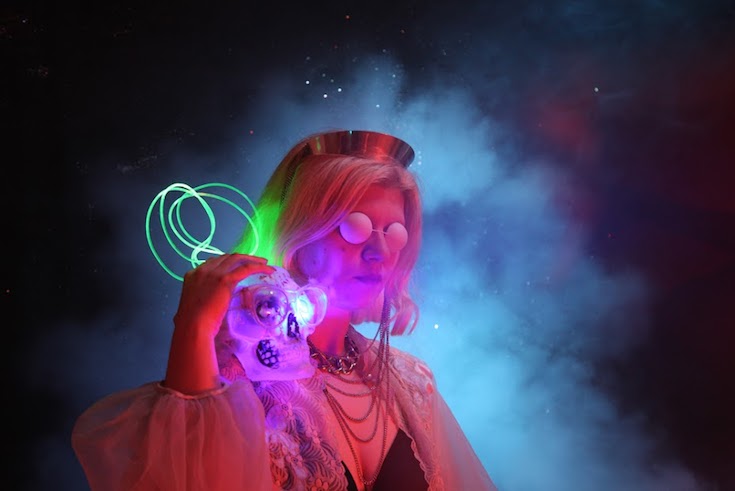 Image by Boris Eldagsen
Image by Boris Eldagsen
So what’s the point of making political art, is it an attempt to influence people in one way or the other? Or is it the other way round, where politics affect you to the point that it manifests in your art?
It's hard to answer. The subjects that I'm most interested in are cultural and social, it seems that naturally they appeal first to those who are similarly inclined - interested in human rights, questions of identity and so on. But essentially, they are confrontational to those who disagree or are simply not interested, and there is an attempt to reach them too, perhaps raise a few questions. My performances used to be quite a bit more confrontational it seems, or perhaps the audiences that show up now know a little better what to expect, but in certain situations you have to battle your way into people's minds.
What’s it like in a normal day in Mary Ocher’s life? Any staple activities that you routinely do that might play a big role in inspiring you to work?
I have four separate lives; the first is when I am alone in Berlin, another is when my husband is staying with me in Berlin, a third one when we are both in Hamburg, and the last one is when I am on tour. Different routines are connected to each - for instance, the frequency of checking emails, etc. It's mostly about persistence, following a list of tasks that need to be accomplished, as well as deadlines that I create for myself.
If you could change one thing about the world today, what would be the main thing that comes to mind?
I would erase nationalities. We would all be one family of humans, each with a particular cultural legacy, but no superstitions, no prejudice, no hierarchy of passports.
In your essay titled The West Against The People, you tackle the current world economic structure, and also xenophobia - It seems that the two are interrelated. Do you think if we were to rid ourselves of the capitalist economic structure enslaving much of the world today, that would entail the diminishing of Western xenophobia?
I believe the two are strongly related, yes. And I find the idea of a swift change somewhat exciting, but at the same time, terrifying. What rules would we then follow? Humans certainly seem to crave rules.
So are you a socialist?
Worse, I am an anarchist. Anarchism has a terrible reputation, somewhere between being harmful and chaotic to being ridiculous and impractical. It's actually rather about equality, but isms make everything sound like a religion all over again and I believe very strongly in non-violence, no use of force, and that no theory should be forced into practice. One problem the current system faces is the difficulty in hearing the voices of minorities, and we see time and time again how majorities tend to oppress the minorities in most terrifying ways. What capitalism lacks is compassion.
Find Mary Ocher on Facebook here, check out her Bandcamp to hear her music, and her Youtube channel here for more videos.
Main image by Jenny Schaeffer.
- Previous Article Getting Abyusif
- Next Article DGTL: Much More than a Music Festival
Trending This Month
-
Apr 14, 2025
-
Apr 12, 2025



